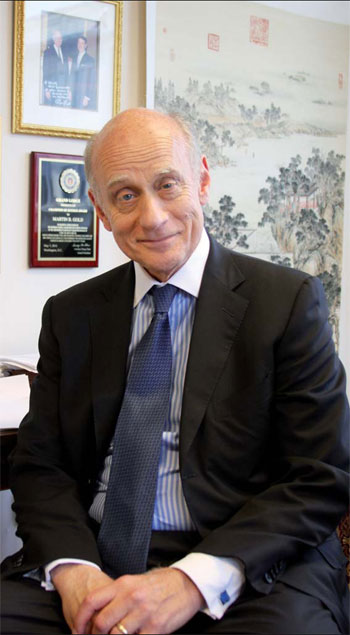Act of honor
Updated: 2012-07-20 07:59
By Tan Yingzi (China Daily)
|
||||||||
|
Martin Gold knew little about the story of Chinese exclusion before a friend raised it with him in Beijing in 2009. Tan Yingzi / China Daily |
A lawyer helps to bring justice on anti-Chinese laws
On the afternoon of June 18, outside the floor of the US House of Representatives, Congresswoman Judy Chu and other Chinese-Americans celebrated the passage of an official apology for past laws excluding Chinese immigrants.
Among those celebrating was a smiling American who, unknown to many, had drawn on his love and respect for China and its people to play a key role in assisting the grassroots campaign to secure Congress' expression of regret.
Martin Gold, a partner of the law firm Covington & Burling LLP in Washington and co-chairman of its lobbying arm, had since 2010 led its pro bono effort on behalf of Chinese-Americans for Congress to redress discriminatory immigration laws enacted between 1879 and 1904.
Last October, the US Senate took the lead with its expression of regret.
"In my 40 years of professional life, I have never worked on a thing that has made me more proud than this," Gold told China Daily soon after publication of his book Forbidden Citizens: Chinese Exclusion and the U.S. Congress, A Legislative History.
The book tells of exclusion laws that violated the civil rights of Chinese immigrants by severely restricting their status and movement in the United States, barring them from becoming citizens, and for a decade, prohibiting Chinese laborers from entering the country.
Although the laws were repealed in 1943 once China had become a US ally in World War II, Congress had never formally acknowledged that an ethnic group was singled out and ostracized, abrogating America's founding principles.
Two years ago a petition signed by about 160 Chinese-American groups was delivered by hand to Chu, the first Chinese-American woman elected to Congress. It urged lawmakers on Capitol Hill to formally apologize for the laws, which were the first major tightening of immigration to the US.
A working group, the 1882 Project, was later set up to push for adoption of the House and Senate resolutions.
Like many Americans, Gold knew little about the exclusion story before the issue was raised during a lunch conversation with a friend in Beijing in 2009. At that time, the legislature in California had just apologized to Chinese-Americans for the state's role in carrying out the racist laws.
After researching the matter, Gold, the grandson of Russian Jews from what is now Belarus, was surprised and upset by the hardship inflicted by the laws and the wrongheaded thinking that produced them. Introduced by a Chinese friend, Gold got in touch with the 1882 Project and offered his help.
The lawyer and his Covington & Burling colleagues spent months poring over old congressional documents, mapping out strategy and lobbying Congress.
The biggest challenge the resolution project faced was the lack of knowledge in the current Congress about the history, Gold says. After informing members about the issue, many said they felt the same as Gold about the injustice.
But he then had to persuade them to apologize, and to do so right away.
"The indispensable element of this success is the community itself," he says. "Congress is a busy place and very little happens by accident. The community acted, organized and Congress looked at it, and was willing to act. It is a sad story with a happy ending, but nobody would bother to tell the story if it didn't matter to the community itself."

 Relief reaches isolated village
Relief reaches isolated village
 Rainfall poses new threats to quake-hit region
Rainfall poses new threats to quake-hit region
 Funerals begin for Boston bombing victims
Funerals begin for Boston bombing victims
 Quake takeaway from China's Air Force
Quake takeaway from China's Air Force
 Obama celebrates young inventors at science fair
Obama celebrates young inventors at science fair
 Earth Day marked around the world
Earth Day marked around the world
 Volunteer team helping students find sense of normalcy
Volunteer team helping students find sense of normalcy
 Ethnic groups quick to join rescue efforts
Ethnic groups quick to join rescue efforts
Most Viewed
Editor's Picks

|

|

|

|

|

|
Today's Top News
Chinese fleet drives out Japan's boats from Diaoyu
Health new priority for quake zone
Inspired by Guan, more Chinese pick up golf
Russia criticizes US reports on human rights
China, ROK criticize visits to shrine
Sino-US shared interests emphasized
China 'aims to share its dream with world'
Chinese president appoints 5 new ambassadors
US Weekly

|

|








